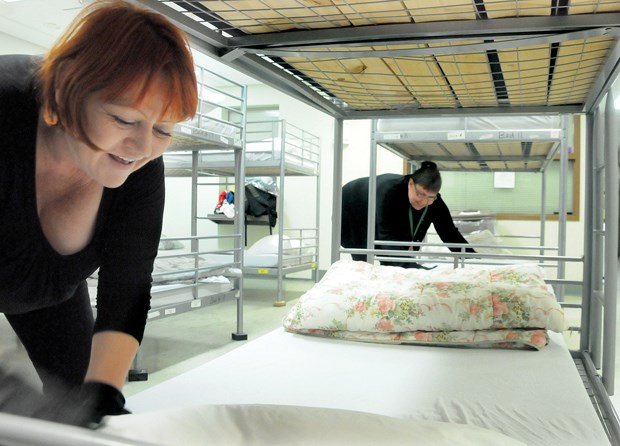There’s a little bit more room at the inn for the North Shore’s homeless population when the weather gets particularly harsh for those outside.
The province has announced it will fund an extra 45 emergency weather shelter spaces at the Lookout Emergency Aid Society shelter on 705 West Second St. and North Shore Neighbourhood House at 225 East Second St.
Any time the forecast calls for three days of heavy rain with a low of 4 C, freezing temperatures or wind chill of 0 C, the extra mats and outreach workers will be available.
“On average last year, the regular shelter ran at a 100.3 per cent occupancy rate. It’s typically full but we sometimes use our overflow beds if we have to,” said Jodi Sturge, deputy executive director of the
Lookout Emergency Aid Society. “Often there are a lot of turn-aways because we don’t have the space or capacity to serve additional people.”
The most recent homeless count in 2014 found 119 people living without permanent shelter on the North Shore. Many of them opt to “sleep rough” in secluded, wooded areas Sturge said, but that becomes far more difficult a task in extreme weather.
“Their ability to adapt to the environment or adapt to the conditions may go down so it’s really important for the outreach staff to go out and engage those folks to let them know that the weather is expected to be bad and give them a warm, safe place to stay for the night, to help them with their health,” she said. “The research really speaks a lot about an increase in mental health conditions. People who are on the street have higher levels of anxiety and depression. They tend to use more alcohol and drugs to stay warm and also, for people who have a pre-existing infection, having wet clothes and no ability to dry doesn’t allow this infection to heal and actually can cause them to get worse.”
Anecdotally, Sturge said she was aware of folks who’ve spent up to 15 years living that way.
North Shore residents can help offer a degree of comfort to their homeless neighbours by making donations to the shelter, Sturge said.
“Winter clothing is very important this time of year – socks, rain jackets, boots, casual clothes, shoes, underwear – the items that really get drenched when it gets really, really wet,” she said.
The shelter does keep a small inventory of donated items so it’s best to call ahead to find out what items are in the highest demand. Always popular this time of year: rain ponchos.
“They’re always really appreciated by folks on the street because they’re light and easy to pull over the other belongings they do have and you don’t necessarily have to worry about the size or fit,” Sturge said.
Residents can also volunteer, either at the shelter or for a charity that supports homeless initiatives like the Dundarave Festival of Lights happening at the end of this month.



